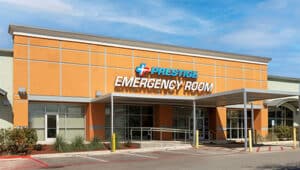Kidney stone symptoms can happen suddenly and be quite severe. And when they do, you need fast, expert care you can trust.
At Prestige ER, our physicians specialize in rapid diagnosis and treatment, providing personalized care to relieve your pain and help you get back to feeling your best.
What Are Kidney Stones?
Kidney stones are hard deposits of minerals and salts that form in the kidneys when urine becomes concentrated.
How Kidney Stones Form
When there is an imbalance of fluids and waste in the kidneys, these minerals and salts (e.g., calcium, oxalate, and uric acid) crystallize and grow into stones over time.
Different Types of Kidney Stones
The most common type of kidney stones are calcium oxalate stones, accounting for about 80% of all cases.
Additional types of kidney stones include:
- Uric acid—caused by highly acidic urine.
- Struvite—caused by urinary tract infections (UTIs).
- Calcium phosphate—caused by alkaline urine and UTIs
- Ammonium urate—caused by poor nutrition and UTIs.
- Mixed (those containing more than one type of crystal)
- Cystine—caused by a rare genetic disorder called cystinuria.
What Causes Kidney Stones
Kidney stones do not have a single, definite cause. However, several factors can increase your risk. Kidney stone causes include:
- Diet (e.g., high intake of sodium, sugar, and oxalate-rich foods).
- Chronic dehydration.
- Certain medical conditions (e.g., hyperparathyroidism, gout, and UTIs).
- Certain medications and supplements (e.g., vitamin C, calcium-based antacids, and diuretics).
- Genetics and family history.
- Gender and age (men are more likely to develop kidney stones, especially between ages 30 and 50).
- Metabolic conditions (e.g., diabetes).
- Digestive diseases or bariatric surgery.
- Obesity.
- Smoking.
Symptoms of Kidney Stones
Symptoms of severe kidney stones include:
- Sudden, sharp, or severe pain in the lower back, belly, or side.
- Pain that radiates to the lower abdomen and groin.
- Pain that fluctuates in intensity.
- Pain that comes in waves.
- Pain or burning sensation when urinating.
- Pink, brown, or red urine.
- Cloudy or foul-smelling urine.
- Frequency and urgency of urination.
- Nausea and vomiting.
- Fever and chills.
Kidney Stone Diagnosis and Detection
If you are exhibiting signs of kidney stones, your provider may run one or more of the following diagnostic tests and procedures, depending on your symptoms and severity:
- Urine testing—to analyze urine concentration, minerals, salts, and passed stones.
- Blood testing—to analyze calcium and uric acid levels and to monitor your kidney health.
- CT or X-ray imaging—to detect small kidney stones in the kidneys, ureters, bladder, and urethra.
Complications of Kidney Stones
If left untreated, kidney stones can lead to one or more medical emergencies, including:
- UTIs
- Kidney inflammation (hydronephrosis).
- Kidney damage.
- Kidney infection.
- Chronic kidney disease.
- Blood in the urine (hematuria).
- Recurrent kidney stones.
- Sepsis.
How to Prevent Kidney Stones
Dietary Changes for Kidney Stone Prevention
If you are genetically predisposed to or have a history of kidney stones, eating a kidney-healthy diet can help prevent their development. Here are a few dietary guidelines:
- Stay hydrated.
- Eat five servings of fruit and vegetables daily.
- Add citric acid and calcium-rich foods to your meals.
- Avoid foods high in oxalate (e.g., spinach, rhubarb, beets, tea, nuts, and chocolate).
- Limit animal protein.
- Reduce sodium.
- Avoid high doses of vitamin C supplements.
- Avoid sugary foods and drinks.
- Exercise regularly and maintain a healthy weight.
Medical Treatments to Reduce Risk
If you maintain a healthy diet and lifestyle habits and still struggle with kidney stone symptoms, consult your provider for the next steps. Depending on the cause and severity of your kidney stones, they may recommend certain medications or medical treatments, such as:
Medications
- Thiazide diuretics.
- Potassium citrate.
- Allopurinol.
- Magnesium supplements.
- Alkalizing agents.
Medical Treatments
- Monitor calcium intake.
- Treat underlying conditions (e.g., diabetes, hyperparathyroidism, gout).
When to Seek Emergency Care for Kidney Stones
If you are experiencing severe kidney stone symptoms, like pain, fever, chills, nausea, difficulty or pain when urinating, or blood in your urine, go to your nearest Prestige ER location for immediate medical attention.
What to Expect at Prestige ER
When you visit Prestige ER for kidney stone treatment, here is what you can expect:
- Rapid pain assessment medical history.
- Physical examination.
- Urine analysis and blood tests.
- CT, X-ray, or ultrasound imaging.
Once your emergency physician understands the cause of your pain, they will provide appropriate treatment. This may include:
- Pain relief medication.
- IV fluids.
- Medication to support stone passage.
- Referral to a urologist for further evaluation and treatment, if needed.
- Post-visit instructions (e.g., follow-up care and prevention tips).
Why Choose Prestige ER for Kidney Stone Treatment
Prestige ER is equipped to handle a broad range of pediatric emergency services, including kidney stone treatment.
We are veteran-owned and dedicated to providing excellent care to patients of all ages in our San Antonio community.
Our mission is to provide personalized, compassionate care for you, your children, and your entire family—365 days a year, 24 hours a day.
Need medical help? Find a location near you and walk in for same-day care and treatment for kidney stone symptoms.












